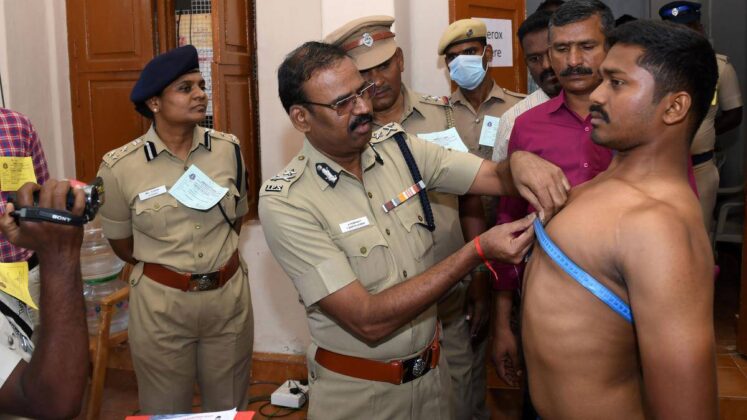Are you dreaming of joining the police but worried that your weak eyesight or glasses might hold you back? You might be wondering, “Can I still join if my vision isn’t perfect?” It’s a common concern, and many people face doubts about whether their eyesight will meet the requirements.
Don’t worry! In this blog, we’ll explain the “minimum eyesight standards for police recruitment“, “what happens during the vision test“, and “how solutions like LASIK surgery might help you clear the test“. Keep reading to find out everything you need to know to get one step closer to your goal of becoming a police officer!
Contents
General Eyesight Requirements for Police
 When it comes to government job recruitment, particularly for police and SSC constable roles, one of the most important criteria is your eyesight. Failing to meet the required standards can unfortunately lead to rejection, no matter how strong your other qualifications may be.
When it comes to government job recruitment, particularly for police and SSC constable roles, one of the most important criteria is your eyesight. Failing to meet the required standards can unfortunately lead to rejection, no matter how strong your other qualifications may be.
So, what are the general eyesight standards for these positions?
Distant Vision: This refers to your ability to see objects clearly from a distance, which is essential for police officers who need to recognize faces, signs, and potential threats from far away. For most police and SSC constable roles, candidates need to have:
Better Eye: A perfect vision of 6/6 (20/20) without glasses or contact lenses.
Weaker Eye: A vision of 6/9 (20/30) without any corrective lenses.
If your eyesight is worse than this, you may be disqualified from the recruitment process.
Color Blindness: Police officers need to correctly identify colors, whether it’s reading traffic lights, distinguishing between uniforms, or recognizing specific signals. If you have color blindness, it can be a disqualifying factor for many police forces and SSC Constable positions. The ability to distinguish all colors is a must.
Myopia (Nearsightedness): You can have up to -4.00 D.
Hypermetropia (Farsightedness): You can have up to +4.00 D.
Astigmatism: The allowable limit is ±2.00 D.
Refractive Errors: These are conditions like nearsightedness, farsightedness, or astigmatism that can cause blurry vision. Each type of refractive error has specific limits that candidates must meet.
If your refractive error exceeds these limits, you’ll need to explore corrective options like glasses, contact lenses, or even LASIK surgery to meet the standards.
State-wise Specific Requirements
While the general eyesight requirements for police and SSC constable positions are similar across India, each state may have its own variations.
Delhi Police Constable
The Delhi Police Constable position has slightly relaxed eyesight requirements compared to other states. The visual acuity criteria are:Better Eye: Minimum 6/12 vision.
Weaker Eye: Minimum 6/18 vision.
These standards apply without the use of glasses or contact lenses, so candidates with slight vision impairment may still be eligible.
Rajasthan Police
Rajasthan Police has a more stringent approach when it comes to eyesight standards. For candidates to be eligible:Distant Vision (Without Correction): Both eyes must meet 6/6 and 6/9.
Color Blindness: Not allowed.
Candidates should ensure their vision meets these requirements, as failing to meet them will lead to disqualification from the recruitment process.
MP Police Constable
Madhya Pradesh (MP) Police follows the standard criteria for most police positions:Visual Acuity: Generally follows the 6/6 and 6/9 standard.
While specific details may not always be specified in the official notifications, candidates should assume that meeting these vision standards is necessary.
SSC CPO (Central Police Organization)
The SSC CPO recruitment process demands strict adherence to eyesight criteria:Distant Vision (Without Glasses): Must meet 6/6 and 6/9.
Color Blindness: Not allowed.
Refractive Errors: Must fall within the standard limits.
Candidates looking to join SSC CPO must ensure their eyesight is up to the mark, as the recruitment committee does not offer exceptions.
Haryana, Punjab, and Bihar Police
These states maintain similar standards for their police recruitment process:Distant Vision (Without Glasses): Must meet 6/6 and 6/9.
Color Blindness: Not allowed.
Refractive Errors: Myopia can be up to -4.00 D, and Hypermetropia can be up to +4.00 D.
As with other states, color blindness is a disqualifying factor, and candidates must have vision within these limits.
What Happens During the Medical Examination?
This is where your eyesight will be thoroughly tested, and any vision-related issues will be flagged. Understanding what to expect during this examination can help you prepare and ensure that your vision meets the required standards.
Visual Acuity Test (Snellen Chart)

- You’ll be asked to stand at a designated distance (usually around 6 meters or 20 feet) from a Snellen chart—a large eye chart displaying rows of letters in decreasing size.
- You’ll be asked to read the smallest line of letters you can see clearly, starting from the top of the chart. This test is done for each eye separately.
Your visual acuity is measured as a fraction, where the first number represents the distance at which you stand (6 meters), and the second number represents the distance at which a person with normal vision can read the same line. For example, a 6/6 vision means you can read at 6 meters what a person with normal vision would read at the same distance.
- Passing Standards: Most police forces and SSC Constable exams require you to have 6/6 vision in your better eye and 6/9 in your weaker eye—without the use of glasses or contact lenses.
Color Blindness Test
- Typically, a pseudoisochromatic plate or Ishihara color plates are used for this test. These plates are a set of images with numbers embedded in a pattern of colored dots. If you are colorblind, you may not be able to distinguish certain numbers or patterns from the background color.
- Candidates should be able to identify all colors correctly. If you fail the color blindness test, you will likely be disqualified from the recruitment process.
Refractive Error Test
Refractive errors like myopia, hypermetropia, and astigmatism are also assessed during the medical exam. These errors can cause blurry vision and are checked using a retinoscope or by examining your refraction with a phoropter.
- The examiner will shine a light into your eyes to measure how well your eyes focus light. If you have a refractive error, corrective measures like glasses or contact lenses may be recommended.
- You’ll be asked to read a chart or identify symbols while the doctor adjusts the lens power to measure the severity of the refractive error. If your refractive error is within the permissible limit (for example, up to -4.00 D for myopia or +4.00 D for hypermetropia), you’ll pass this part of the test.
General Eye Health Check
Apart from visual acuity, color vision, and refractive error, the doctor may also check the overall health of your eyes. This includes testing for conditions like cataracts, glaucoma, or other issues that could impair your ability to perform police duties.
How to Prepare for the Eye Test?
To increase your chances of passing the eyesight portion of the medical examination, here are a few tips:
- Get a Comprehensive Eye Checkup: Before the recruitment process, schedule a full eye exam with an optometrist. This will give you a clear picture of any potential issues and help you take corrective steps if needed.
- Correct Refractive Errors Early: If you wear glasses or contact lenses, make sure that your prescription is up-to-date. If you’re considering LASIK surgery, it’s wise to get it done well in advance of the recruitment process to ensure a smooth recovery and pass the medical exam.
- Practice Eye Exercises: Regular eye exercises can help reduce strain and potentially improve your vision. Additionally, maintaining a balanced diet rich in vitamin A and other nutrients will keep your eyes healthy.
By understanding the medical examination process and preparing accordingly, you can ensure that your eyesight won’t be a barrier to your dream job.
Can LASIK Surgery Help in Clearing the Police Eye Test?

For many candidates with refractive errors like myopia (nearsightedness), hypermetropia (farsightedness), or astigmatism, LASIK surgery can be an option to help meet the eyesight requirements for police and SSC constable recruitment.
LASIK (Laser-Assisted in Situ Keratomileusis), which is a well-known surgical procedure, is designed to correct vision issues and reduce dependency on glasses or contact lenses.
So, are you someone struggling with glasses and looking to join the police? Let’s explore the pros and cons, along with when LASIK might not be an option.
Pros of LASIK Surgery
Vision Correction
For candidates with refractive errors like myopia (up to -6.00 D), hypermetropia (up to +4.00 D), or astigmatism (up to ±2.00 D), LASIK can correct these issues and bring their vision up to the required standards for police recruitment.Speed of Recovery
Most patients experience a significant improvement in vision within 24 hours, and you can typically return to your regular activities in just a couple of days. This makes LASIK an appealing option for candidates who need to pass the medical examination quickly and efficiently.No Need for Glasses or Contact Lenses
LASIK removes the dependency on corrective lenses (glasses or contacts). This is particularly useful for police officers who need to have clear, unimpeded vision at all times, especially when engaging in physically demanding tasks or during high-stress situations.Flapless LASIK (Advanced LASIK Options)
Flapless LASIK or TransPRK is a newer, advanced version of the surgery that is touchless, painless, and does not involve the creation of a corneal flap. This procedure is undetectable during medical exams and has a quicker recovery time compared to traditional LASIK.
Cons of LASIK Surgery
Possible Complications
While complications are rare, they can include dry eyes, night vision issues (like halos or glare), undercorrection or overcorrection of vision, or the possibility of needing an additional procedure in some cases.Not Suitable for Everyone
LASIK is not an option for all candidates. If you have certain eye conditions like severe dry eyes, corneal diseases, or very thin corneas, LASIK might not be suitable.Long-Term Risks
While LASIK has a high success rate, some individuals may experience changes in their vision over time. Though rare, there could be instances where the vision may degrade or fluctuate, necessitating further treatment or corrective measures.Acceptance in Government Exams
Although LASIK is allowed for most government exams and recruitment processes, it’s important to verify the specific requirements for each exam. Some recruitment agencies might have additional criteria, such as a waiting period after LASIK surgery before being eligible for the medical examination.
For example, certain exams may require you to wait at least 6 months post-surgery to ensure stability of your vision.
When LASIK Might Not Be an Option
While LASIK offers excellent results for many candidates, there are certain conditions under which LASIK surgery may not be an option:
- Severe refractive errors: If your refractive error exceeds the limits for LASIK, corrective surgery may not be an option.
- Eye health conditions: Conditions such as cataracts, glaucoma, or corneal irregularities may disqualify you from LASIK.
- Age: LASIK is typically not recommended for individuals under the age of 18, as the eyes may still be changing, and correction might not be permanent.
- Pregnancy or nursing: If you are pregnant or breastfeeding, LASIK surgery may not be advisable due to potential hormonal fluctuations that can affect your vision.
LASIK surgery can be a great solution for many candidates looking to correct refractive errors and meet the eyesight standards for police recruitment. However, before proceeding with LASIK, it’s essential to consult with an eye care professional to ensure you’re a suitable candidate and fully understand the potential risks.
Tips for Maintaining Healthy Eyesight
- Regular Eye Checkups: Schedule annual eye exams to catch potential issues early.
- 20-20-20 Rule: Every 20 minutes, take a 20-second break and look at something 20 feet away to reduce digital eye strain.
Eat a Vision-Healthy Diet:
Vitamin A: Carrots, sweet potatoes, spinach.
Vitamin C: Oranges, strawberries, bell peppers.
Lutein & Zeaxanthin: Leafy greens, eggs, corn.
Omega-3: Salmon, walnuts, flaxseeds.
- Protect Your Eyes from UV: Wear UV-protective sunglasses and a wide-brimmed hat.
- Practice Eye Exercises: Blink rapidly, do palm exercises, and shift focus between near and far objects.
- Quit Smoking: Reduces the risk of macular degeneration and cataracts.
- Stay Hydrated: Drink plenty of water to prevent dry eyes.
- Get Adequate Sleep: Aim for 7-9 hours of sleep for eye rest and hydration.
- Avoid Rubbing Your Eyes: Prevent irritation or injury.
- Wear Proper Eyewear: Use protective glasses when working or playing sports.
Conclusion
If you’re struggling with the daily hassle of wearing glasses or contact lenses, and it’s stopping you from joining the police force, LASIK could be the solution you need! Don’t let your eyesight hold you back from your dream job.
Book your free consultation now and take the first step toward a clearer future in the police force!
Experience the freedom of clear vision with LASIK Surgery at EyeMantra.
Call us at +91 9711116605 to book your free appointment today!



